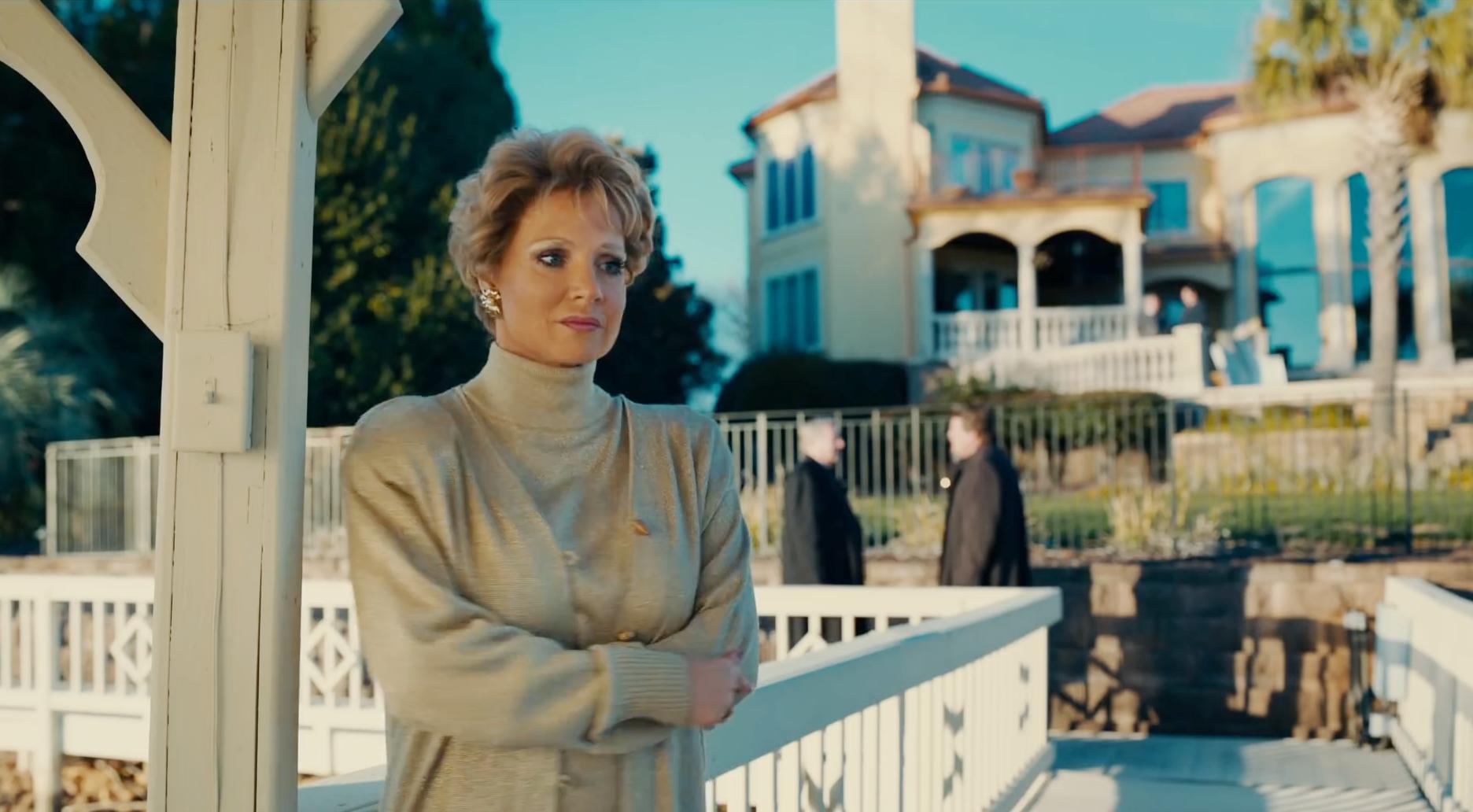In the opening scene of The Eyes of Tammy Faye, an unrecognizable Jessica Chastain is an early 90s Tammy Faye Bakker, primping before a mirror in preparation for an interview. As she explains, both her lips and eyes are lined with permanent ink, and her eyelashes—a beloved trademark—never, ever come off. It’s a startling, candid juxtaposition of self-deprecation and utmost sincerity.
The same could be said for Michael Showalter’s tragicomic new picture, based on the 2002 documentary by Fenton Bailey and Randy Barbato of the same name, a colorful, often enjoyable study of an unloved child who spent her life seeking approval, found it and then plummeted back to a sad final act. Through it all she kept the faith. I keep hearing that this is a “routine” biopic and that it “doesn’t answer questions” about the Bakker’s scandals. Would anyone like to mention how entertaining it is?
We first meet Tammy Faye in International Falls, Minnesota, circa 1952, an outcast child of a domineering mother (a terrific Cherry Jones) and shunned as the product of a divorce, forbidden to attend the local church (where mom plays the piano) until surreptitiously entering during Sunday service, collapsing before the altar and speaking in tongues. “It’s a miracle!” parishioners exclaim. Suddenly, a savior.
In a college theology class, Tammy Faye meets one Jim Bakker, who having abandoned his dream of being a rock deejay in favor of ministry, is immediately taken with his outspoken classmate. In a well-written courtship scene, she explains just what she likes about herself: “People think I’m dramatic, but I like myself that way.”
After a quickie marriage and to her mother’s dismay, the newlyweds hit the road to start their own church, and an early moment where Jim’s flashy new car is repossessed signifies things to come. Their humble beginning involves a traveling puppet show, believing that if children love them, parents will follow. This strategy works, and soon they have caught the attention of televangelist Pat Robertson.
Soon Tammy Faye bolsters Jim’s confidence that could do television as well. Attending a pool soiree at the Robertsons’ splashy home (“We paid for this,” Jim whispers) Tammy Faye spars with the malevolent Jerry Falwell (Vincent D’Onofrio) after sitting at the men’s table and questioning why God would reject feminism and homosexuals: “God doesn’t make junk,” she lectures Jerry (who insists she call him Mr. Falwell). Throughout, Tammy Faye is presented as a progressive figure that believes religion and politics are mutually exclusive.
As Jim and Tammy Faye’s on-air routine takes off so does the PTL empire and Tammy Faye’s superstar status. Showalter has a great time featuring Tammy Faye’s rise in delightfully gauche style, including a number of glitzy production numbers offering Chastain a prime opportunity to channel Tammy Faye’s, ahem, peculiar song stylings. This is fairly standard, though not unenjoyable.
In typical biopic montages, Showalter depicts the rise of PTL—recreations of actual shows, begging for donor dollars, phones lighting up, stick-sweet sincerity on air—and both actors do well traversing PTL’s 70s and 80s heyday, money rolling in, up to their eyeballs in national acclaim, including an endorsement from Ronald Reagan, whose re-election campaign they vigorously supported.
What goes up must also come down as intimacy fades, tensions rise and Tammy Faye is tempted into a chaste dry-humping flirtation with her Nashville record producer Mark Wystratch (Gary Paxton), depicted as an emotional and important milestone for Tammy Faye, and one that Jim will later use to rationalize his own dalliance with Jessica Hahn.
When it comes to fraud and Jim’s indictment, Abe Sylva’s screenplay is coy about what Tammy Faye really knew; an in-depth assessment of corruption this is not and the scope, machinations and actual criminal details are deliberately fuzzy. Instead, Tammy Faye is presented here as the woman behind the man, a canny architect of her husband’s onscreen persona and PTL’s success who was blindsided by the illegality of it all. According to Sylva, Jim kept the mechanics of the dirty business from Tammy Faye, who was PTL’s shining star, a charisma-fueled celebrity connecting with their audience through down-to-earth humor and song.
Since Jim and Tammy Faye both believe from the get-go that God’s plan is for all to be “prosperous,” and that God wouldn’t want anyone to live in poverty, they accept that, for example, using donor money to buy a fur coat for mom Rachel is part of God’s plan. Showalter shows Tammy Faye in full acceptance of the couple’s splashy fortune and a high-rolling lifestyle that donors, or “partners” as the Bakkers called them, have paid for in the name of Jesus. They knew the game and played it very well. The Bakkers are also not above exploiting their personal trials for on-air donations, including their alleged persecution at the hands of the “secular press” and Tammy Faye’s adulterous missteps.
In a tremendously felt disappearing act of great compassion executed with technical and emotional virtuosity, Chastain’s full-bodied portrait of Bakker is, perhaps, her masterwork. For the last decade it’s been clear to anyone paying attention that the star is the heir apparent to Meryl Streep in terms of versatility and immersion (even when recent movie choices have let her down). She does nothing halfway.
Aging decades onscreen, the star radiates warmth through Tammy Faye’s perpetual giggle and sing-song, Betty Boop voice, whether teaching her audience about erectile dysfunction or encouraging her staff to compliment her stern mother because “she’s not had enough love in her life.” Later, when she’s an object of ridicule by some local teens, she marches up and introduces herself: “You’re allowed to make fun of me but you have to meet me first. I’m your neighbor.” There’s also a bittersweet moment where Tammy Faye tries to re-launch herself, bottom up, pitching a TV pilot to a young producer and met with rejection. Chastain’s sunny-sad reaction is heartbreaking.
And there are many other key performance moments—overhearing Jim and company refer to her as a clown, a recreation of a controversial on-air interaction with AIDS patient and pastor Steve Pieters, a coerced on-air confession of sin, a painful hospital goodbye after giving birth, a final parting with Jim prior to his arrest—that allows Chastain to demonstrate a depth of emotional intelligence uncommon even in today’s A-listers. Singing, dancing, funny, tragic, optimistic, defeated, youthfully exuberant and lonely in middle age—she does it all.
Garfield, a two-time Tony winner delivering perhaps his best onscreen performance, plays a wily Bakker from fledgling puppeteer to broadcasting magnate, adeptly conveying Jim’s smarmy manipulations, from hiding PTL’s woes to his closeted bisexuality.
Garfield ages into make-up wrinkles and wisps of gray hair but it’s Chastain, expectedly, who gets the biggest makeover. Tammy Faye’s excessive and broadly gauche trademarks of overly teased hair, massive 80s shoulder pads, caked-on make-up and running mascara layered on as if armor, were a radical amplification of femininity and way to gain superficial acceptance but instead were widely derided as tasteless fashion faux pas. It’s all here, but the inclusion of such elements seems less about disappearing into prosthetics and more about who she really was, post-Jim, the artifice as an expression of her true self.
The look of the film is a treat, drenched in period pastels and a cavalcade of costumes and hairstyles, from pants suits hung on oversized shoulders to disco glitter headbands.
For those who dismiss Bakker out of hand as a “grifter,” the picture is less apologia for any of Bakker’s perceived indiscretions and more a plea for understanding and compassion—Bakker’s personal, theological philosophy—for a woman who was a study in contradictions but whose heart and mantra that all, everywhere, were worthy of God’s love—were unshakable.
3 stars.



